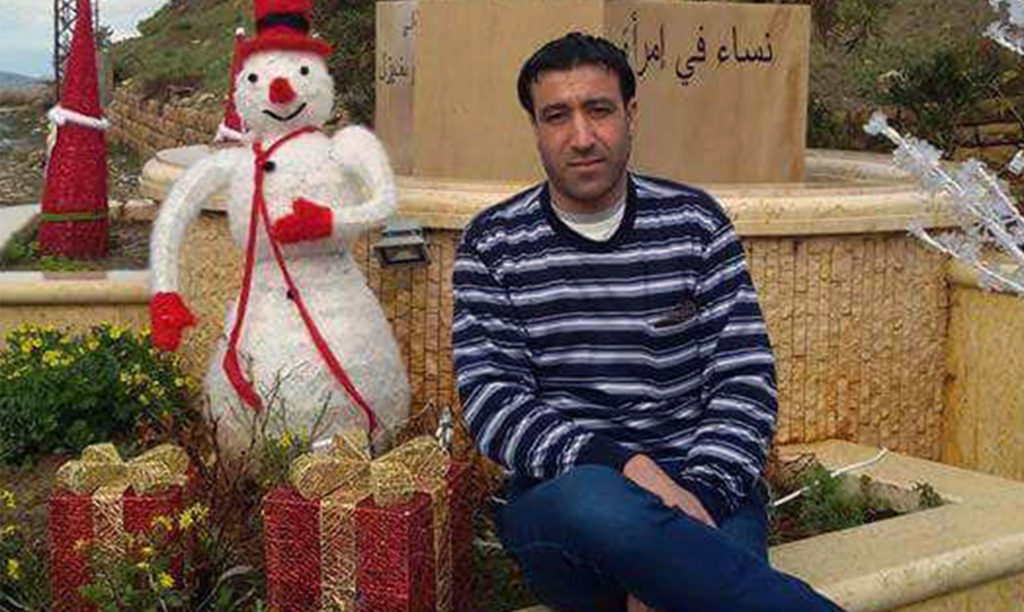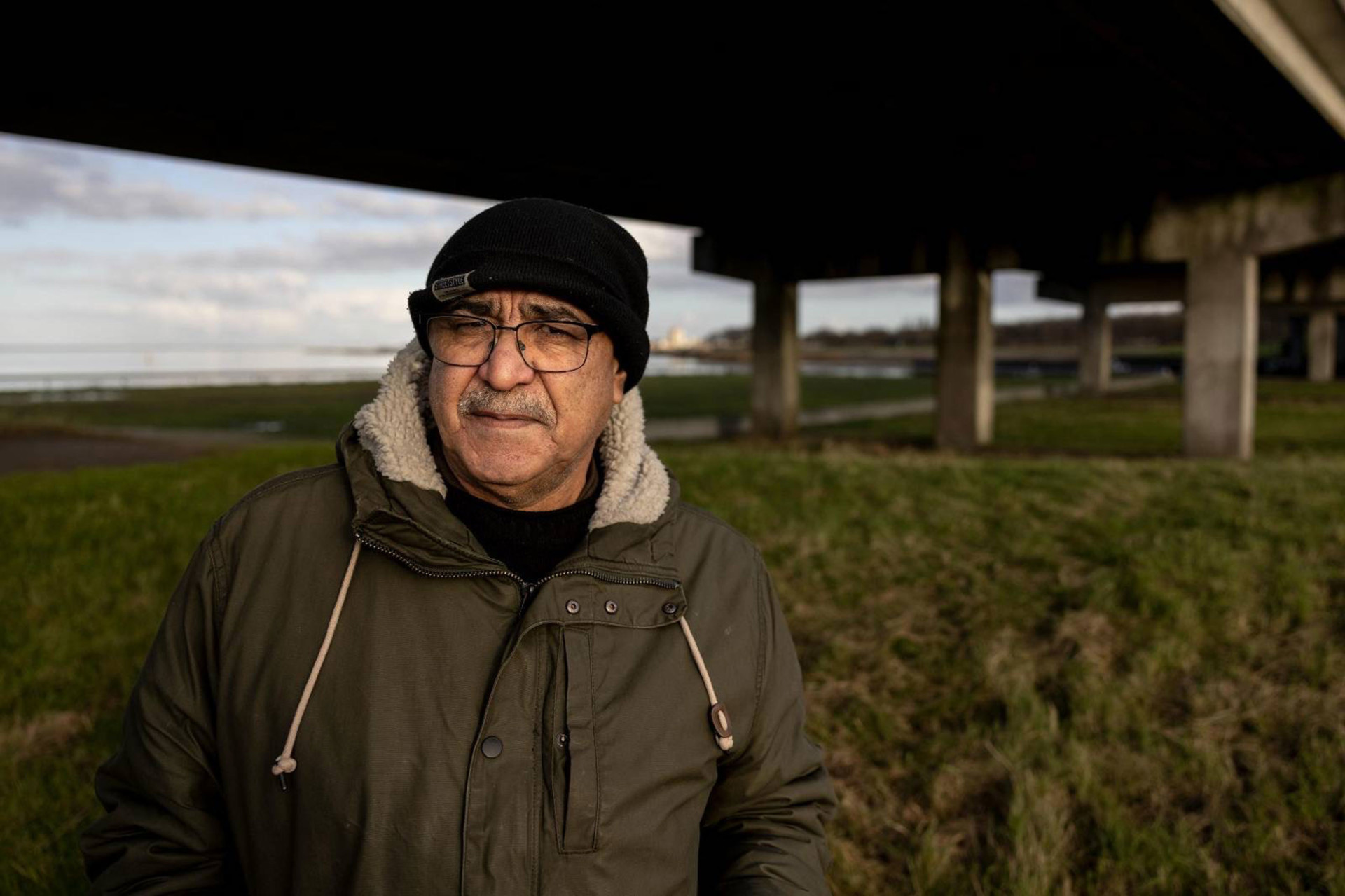At 61, Mhesn Alabdullah knows that he will likely never again see his native village of Khreta, in the Syrian governorate of Homs. With his trimmed gray mustache, dark knit cap and fleece-lined winter parka, he looks out of place in the seaside December cold of the Netherlands. (He asks that New Lines not name his exact location.)
Like most refugees, Alabdullah has a traumatic story to tell. Only his is not his own but that of his much younger cousin, Muhammad Taha Ismail Alabdullah, more commonly known as Hamadi Bouta.
In 2017, Bouta, a Syrian army deserter, was kidnapped and tortured on camera by a handful of mercenaries affiliated with the Wagner Group, a notorious paramilitary organization financed by the Western-sanctioned Russian oligarch and catering magnate Yevgeny Prigozhin. The U.S. has labeled Wagner a “proxy force” of the Russian Ministry of Defense, and its ties to the GRU, Russia’s military intelligence service, are well established.
The murder movie shot by Wagner is stomach-turning. A carousel of four Russian-speaking men took turns beating Bouta with a sledgehammer. Then they cut off his hands and head with a shovel before stringing up his corpse by the feet and setting it alight. “Of course I couldn’t finish the video,” Alabdullah says, adding that there’s a longer version of it his relatives have seen. “They told me about the rest: that his head was cut off and they played soccer with it, kicking it at the wall with their feet.”
On Dec. 19, New Lines, in partnership with Estonian news outlet Delfi and the Swedish newspaper Dagens Nyheter, published a series of interviews with family members of dead Wagner fighters, all based on a massive digital database compiled over the course of seven years by former Ukrainian intelligence officers. One of those dead fighters, Vladislav Apostol from the Moldovan village of Ciutulești, was one of Bouta’s torturers.
The snuff film Apostol took part in was filmed and uploaded in 2017, although it didn’t gain a wide viewership until two years later. Last week, it was cited by the European Union in its decision to sanction the Wagner Group as a whole, along with three companies and seven individuals connected to it, for “serious human rights abuses in Ukraine, Syria, Libya, the Central African Republic (CAR), Sudan and Mozambique, which include torture and extrajudicial, summary or arbitrary executions and killings.” Brussels also named Wagner’s commander, Dmitry Utkin, a former GRU officer, as the man responsible for Bouta’s torture and the recording made of it.
“Hamadi was my cousin and used to come to our house and spend time with my children. He was very kind and loving to others,” he tells New Lines from his adoptive home in the Netherlands. Aisha, Bouta’s mother, was killed when Russia bombed Khreta in early 2017, a few months before her son disappeared.
Alabdullah’s children were around the same age as Bouta, who was born in 1986. They grew up and played together as neighbors.
Bouta left Syria in the first year of its anti-government protest movement in 2011, settling in Lebanon to work in construction and help support his wife and four children — two girls and two boys — back in Khreta. A grinding civil war, eventually eclipsed by the rise of al Qaeda and the Islamic State group, had yet to devastate the village, as it would do in virtually every part of the country.
Bouta returned to his homeland for Eid after his mother died. He traveled to Damascus en route to Deir ez-Zor when he was detained by Syrian officials at a checkpoint.
“He sent a voice message to his brother-in-law telling him that he was arrested at a regime roadblock because he was wanted for reserve service in the army and that he was taken to Shayrat air base in the desert outside Homs,” Alabdullah says. “And that he would flee at the next opportune moment. Then he disappeared.”
Bouta’s family lost contact with him for four months. He appears to have gotten lost in a region he wasn’t familiar with before making his way toward a camp he saw from the distance — not realizing it’s where Wagner mercenaries were then stationed. They captured Bouta and taunted him, “saying that he was from Daesh [Islamic State] because he didn’t know where he was heading or any other language except Arabic,” Alabdullah says.
The Syrian Center for Media and Freedom of Expression, the nongovernmental organization that first identified Bouta in the Wagner snuff film, has suggested that the location was close to the al-Shaer gas plant in Homs, northwest of the city of Palmyra, where the mercenaries were known to have an encampment. In 2017, the al-Shaer plant and two other hydrocarbon facilities in Syria earned Prigozhin’s company Evro Polis about $162 million as part of a profit-sharing arrangement it entered into with the Assad regime for extractive fields Wagner helped liberate from the Islamic State.
The liberators’ tactics mirrored their enemies’. Bouta’s mutilation video, redolent of Islamic State propaganda, went viral and made its way into his family’s group WhatsApp channel.
“The film’s impact on us was like lightning,” Alabdullah tells New Lines. “I cannot describe how I felt about what I saw in the film.”
He had heard of Wagner before they murdered Bouta, but he never imagined anyone could be so sadistic. “I wish they killed him with a bullet. It would have been easier.”
Bouta’s mother, Alabdullah says, was “lucky” to have died in an airstrike before she could see her son treated so terribly.
In a grim twist of irony, Bouta’s loved ones must now also share a fate similar to that of his murderers’: being denied the right to honor their dead as they see fit. “Hamadi’s family could not hold a funeral for him in the village,” Alabdullah says. “They tried to build a mourning tent to receive people who wanted to comfort them, but the Syrian regime did not allow it.”

Bouta’s wife and children still live in Khreta in what Alabdullah describes as impoverished conditions. They lack gas or diesel for heating their home; bread is scarce.
While Alabdullah says he’s grateful the world is now waking up to Wagner’s savagery, he isn’t optimistic that EU sanctions will do anything to rein it in. “The sanctions against Wagner are not worth the ink and paper they are written on,” he says.
Since Wagner’s soldiers of fortune are now deployed to even more war zones in the Middle East and North Africa, its atrocities — and notoriety — have grown. Alabdullah is unequivocal about who bears responsibility. “This gang is … supported by the criminal Putin, because the person responsible for it is Putin’s chef,” he says, referring to Prigozhin.
What he wants, he affirms, is justice for Bouta, and he warns that Syria should be seen as a laboratory or proving ground for what Putin’s dark army will get up to next, elsewhere around the world, particularly if Russia invades Ukraine again.
“We accept nothing but imprisonment or the death penalty for these criminals,” Alabdullah says.
Three respected NGOs — the Syrian Center for Media and Freedom of Expression, the International Federation for Human Rights and the Memorial Human Rights Center — face a longshot battle to obtain justice for Bouta’s slaying. They have filed a lawsuit in Moscow’s Basmanny Court on behalf of his brother (whose name New Lines is withholding as he is in hiding) to force Russia’s FBI-like Investigative Committee to open an investigation into the Wagner Group’s atrocity. The suit was filed nine months ago, on the 10th anniversary of the Syrian revolution.
On Dec. 21 New Lines spoke to Mazen Darwish, the president of the Syrian Center for Media and Freedom of Expression, who had just received some unpleasant, albeit predictable, news. The Moscow court has postponed its decision on the plaintiff’s complaint against the Investigative Committee until Jan. 18, 2022.
Darwish is not deterred.
“This is the first time family members of Syrian victims are trying to take legal action to hold Russian suspects responsible for serious crimes committed in Syria,” he says.
“The trial is also important because it takes place in Russia itself. Now the Putin regime cannot claim that the trial is politicized or impartial, as they used to do when international courts sentenced them. And the Russian public will learn about the crimes of its regime through its own courts.”
And should the court permanently delay its decision or find that the Investigative Committee was correct in declining to look into Bouta’s murder, Darwish says he and his colleagues will bring the case before the European Court of Human Rights in Strasbourg.
Settling a Syrian victim’s account with Wagner in the heart of Europe may be the more appropriate location anyway, given the sprawl of the groups’ activities.
“Now they are committing crimes against the Syrian people,” Alabdallah says against a North Sea wind. “Tomorrow they will commit crimes against the Ukrainian people, or another European people.”





